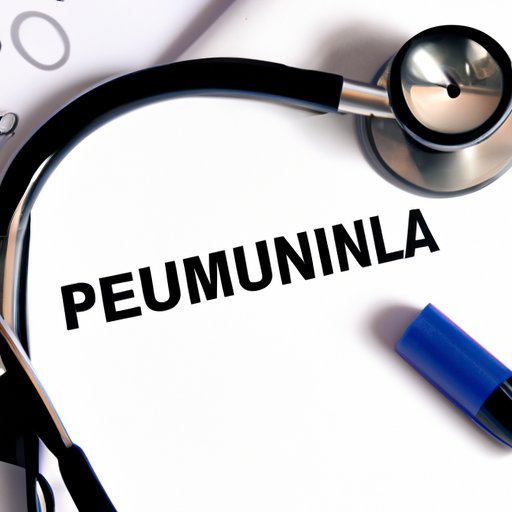
Introduction
Pneumonia is a common lung infection that causes inflammation in the air sacs in the lungs. It can be caused by bacteria, viruses, and other microorganisms, and can range from mild to severe. Pneumonia can be a serious condition, especially for individuals with weakened immune systems or health conditions. Therefore, it is important to understand the common causes of pneumonia and learn how to prevent it. The purpose of this article is to discuss the common causes of pneumonia and provide tips on how to prevent it.
Exposure to Bacteria and Viruses
Pneumonia is often caused by breathing in bacteria or viruses that infect the lungs. Common sources of infection include coughing or sneezing by infected individuals, touching contaminated objects, and inhaling air that contains germs. One effective way to avoid exposure to bacteria and viruses is to wash your hands frequently and avoid close contact with people who are sick. Wearing face masks can also reduce the risk of infection.
Weakened Immune System
Individuals with weakened immune systems are more susceptible to pneumonia. Certain health conditions such as HIV/AIDS and cancer can weaken the immune system and increase the risk of pneumonia. To reduce the risk, individuals with weakened immune systems should stay up-to-date on vaccinations, avoid exposure to sick individuals, and practice good hygiene. This includes washing hands frequently and avoiding touching the face and nose.
Age and Lifestyle
Older adults and children are more prone to pneumonia due to weaker immune systems. Additionally, lifestyle choices such as smoking and excessive alcohol consumption can also increase the risk of developing pneumonia. To reduce the risk, it is important for individuals to exercise regularly, eat a balanced diet, avoid smoking, and moderate alcohol consumption.
Environmental Factors
Poor air quality and pollution can make individuals more susceptible to pneumonia. Exposure to toxins such as asbestos can also increase risk. It is important to reduce exposure to pollutants and toxins by using air purifiers and avoiding areas with high pollution levels. Individuals should also wear protective gear when working in hazardous environments.
Hospital-Acquired Pneumonia
People who spend long periods in hospitals are at risk of developing pneumonia due to exposure to germs and bacteria in the healthcare environment. Hospitals take preventive measures such as using proper ventilation systems and cleaning surfaces regularly to reduce the risk of hospital-acquired pneumonia. Patients can also reduce the risk by washing their hands frequently, avoiding touching the face and nose, and asking healthcare providers to wash their hands.
Conclusion
Pneumonia is a common lung infection that can have serious health consequences, especially for individuals with weakened immune systems or health conditions. It is important to understand the common causes of pneumonia and learn how to prevent it. This can be done by avoiding exposure to bacteria and viruses, maintaining a healthy lifestyle, reducing exposure to environmental factors, and taking preventive measures to reduce the risk of hospital-acquired pneumonia. By taking action to protect themselves, individuals can reduce the risk of pneumonia and maintain good health.





